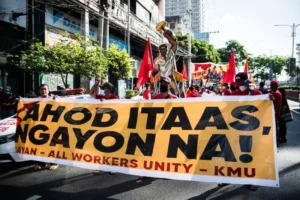Carrying pots and pans, members of Gabriela, Gabriela Women’s Party, and Amihan launched a noise barrage at the Department of Agriculture on July 7 to highlight the worsening hunger among the people. They cited the recent survey by Social Weather Stations (SWS), which says that one in every five Filipino families, or 27.2%, experiences ‘involuntary hunger’ or persistent lack of access to food caused by poverty, violence, or environmental changes.
“The sight of empty pots and pans is a stark reality for too many Filipino families today. Here in Quezon City alone, several women from urban poor communities we have spoken to said they often eat only once or twice a day to save money,” Gabriela Philippines vice president Cora Agovida said.
She said that women and children are the most vulnerable in this crisis. Most women in poor communities report that they skip meals so their children can have enough to eat. When their husbands’ daily wages fall short, they find ways to augment the budget by scavenging or doing laundry for others.
“This is already happening in the center of QC, what more in other provinces where life is even harder? Wages are already highest here in NCR, but they are still far from a living wage,” Agovida pointed out.
Amid worsening poverty, Gabriela expressed concern over the almost unreachable prices of basic food items, especially rice and other essential agricultural products. According to the group, the food crisis stems from the government’s reliance on agricultural product importation.
“Even the promised ₱20/kg rice depends on imports. Our country has vast rice fields, so why does the DA not ensure that Filipinos benefit from them? Where is the support for local farmers?” Agovida asked.
Amihan secretary general and Bantay Bigas spokesperson Cathy Estavillo emphasized during the protest that selling rice at ₱20 per kilo at Kadiwa Centers under the ‘Benteng Bigas Meron Na’ program will not resolve the widespread hunger experienced by the Filipino people.
She said that ₱20 per kilo rice is not sustainable because under RA 11203 or the Rice Liberalization Law, private traders and importers control the buying and selling of palay while the NFA’s mandate is limited to buffer stocking. “These businessmen will disagree to making no or low profit,” Estavillo said.
“This does not address the fundamental problems of farmers such as lack of land, insufficient significant support for production like farm inputs and post-harvest facilities, lack of irrigation, and support price for palay procurement.”
The government must address the root causes of the rising costs of palay production and the falling farm gate price, which lead to lower rice prices in the market, the group said. This month alone, the price of palay dropped to ₱9–10 per kilo, far from their demanded of at least ₱21 per kilo. This price is almost as low as in 2019, when it fell to ₱7 after the Rice Liberalization Law was enacted.
“This Benteng Bigas Meron Na program will only serve as a publicity stunt for the upcoming SONA if the root causes of the problem are not addressed,” Estavillo added.
Amihan is pressing the US-Marcos regime to repeal RA 11203 or the Rice Liberalization Law, restore the NFA’s mandate to buy palay and sell affordable rice, strengthen local production so the country does not always depend on imports, and implement genuine land reform as the foundation for rural development and food security.
“We cannot allow this administration to continue turning a blind eye to the suffering of our people. We demand an end to import dependence and concrete measures to strengthen our local economy through robust support for Filipino farmers. It’s time to prioritize food security and the welfare of our own people over profit-driven import policies,” the group appealed.










